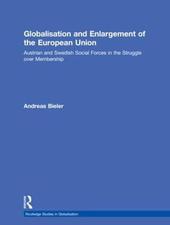
|
Globalisation and Enlargement of the European Union: Austrian and Swedish Social Forces in the Struggle Over Membership
Hardback
Main Details
| Title |
Globalisation and Enlargement of the European Union: Austrian and Swedish Social Forces in the Struggle Over Membership
|
| Authors and Contributors |
By (author) Andreas Bieler
|
| Series | Routledge/Warwick Studies in Globalisation |
|---|
| Series part Volume No. |
No.2
|
| Physical Properties |
| Format:Hardback | | Pages:208 | | Dimensions(mm): Height 234,Width 156 |
|
| Category/Genre | International economics
Political economy |
|---|
| ISBN/Barcode |
9780415213127
|
| Classifications | Dewey:341.2422 |
|---|
| Audience | | Undergraduate | | Postgraduate, Research & Scholarly | |
|---|
| Illustrations |
15 tables
|
|
Publishing Details |
| Publisher |
Taylor & Francis Ltd
|
| Imprint |
Routledge
|
| Publication Date |
18 May 2000 |
| Publication Country |
United Kingdom
|
Description
On January 1 1995, Austria and Sweden joined the European Union (EU). This book analyzes why these two countries joined at such a moment when in fact the EU's development towards a neo-liberal economic policy - embodied in the Internal Market and the convergence criteria of Economic and Monetary Union - endangered their traditional Keynesian economic policy making, and at a time when the steps towards a Common Foreign and Security Policy threatened their neutrality. The processes leading to Austria and Sweden's accession need to be examined against the structural background of globalisation, which is characterised by the transnationalisation of production and finance, and a shift from neo-Keynesianism to neo-liberalism. Andreas Bieler argues that conventional neo-functionalist and intergovernmentalist theories fail to explain structural change such as this because they take existing power structures as given. Therefore, he develops a neo-Gramscian perspective as an alternative approach to European integration. This book reveals that alliances of internationally oriented, transnational social forces of capital and labour, supported by institutions linked to the global economy such as the Finance Ministries, were behind the drive to the EU. Resistance, by national capital and labour, as well as Green and left-wing politics in both countries, could not prevent membership. Also, certain internal structural changes in these countries - Gorbachev's liberal foreign policy for example - allowed pro-EU forces in both countries to redefine neutrality making it compatible with membership. This original study is a key up-to-date analysis which will be essential reading for researchers in onternational relations, international political economy, and European politics in general.
|